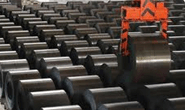Market Data

November 2, 2020
Global Forum Calls for Action on Excess Steel Capacity
Written by Sandy Williams
The Global Forum on Steel Excess Capacity has called for renewed action to address excess steel capacity during a time of economic crisis. The forum offered its analysis and recommendations in its 2020 GFSEC Ministerial Report.
“The pandemic has led the world economy into its worst downturn in decades,” said Valdis Dombrovskis, executive vice-president if GSFEC and co-chair of the Oct. 26 meeting. “Economic sectors have come to a standstill, labor markets have deteriorated sharply, supply chains have been disrupted and financial markets have come under stress. The crisis has also led to the steepest decline in steel demand since the global financial crisis of 2008-09 and could potentially last longer than what was experienced during the previous crisis.
“The risks of growing steel excess capacity in the wake of the Covid-19 crisis have risen sharply, making the work of the Forum more important than ever to help bring transparency and stability to steel markets during these unprecedented times.”
Excess steel capacity is expected to increase to 606 million metric tons this year, noted the Forum, and of particular concern are capacity expansions and policies in non-participating G20 jurisdictions such as China.
The Forum is comprised of ministers and government officials from 29 countries that have agreed to work together following the expiration of its mandate a year ago. China, India and Saudi Arabia discontinued their membership in 2019, Turkey is expected to rejoin in 2021. The Forum has called for all G20 and OECD members to participate.
In its ministerial statement, the Forum offered the following recommendations for G20 leaders to consider:
- Firmly maintain the problem of excess capacity on the G20 agenda;
- Promote the GFSEC principles in tackling the problem; and
- Support the GFSEC as a multilateral way forward, which is open to all G20 and interested OECD members.
“While it is necessary to continue to remove excess capacities that are no longer viable, it is also important to ensure that any capacity expansions are driven by market forces and are in line with true prospects for steel demand in the long term,” said Dombrovskis.







